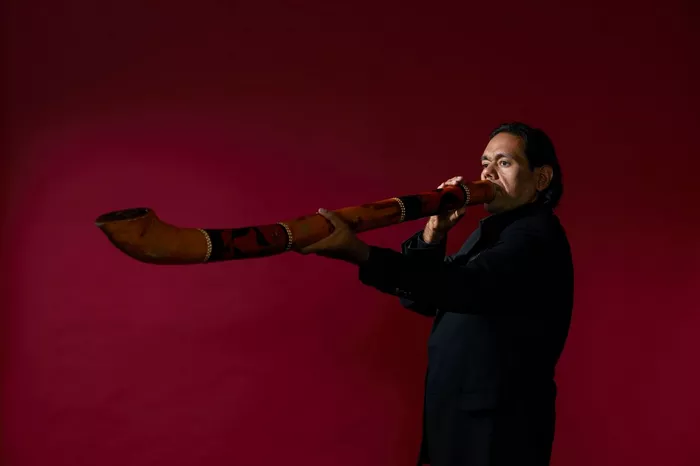Renowned didgeridoo virtuoso William Barton, hailing from the Kalkadunga community, has fostered an intimate relationship with music that spans beyond memory’s reach. He reminisces about his early exposure to the symphonies of classical music, serenaded by his mother even before he entered the world. This auditory foundation became intertwined with the cultural tapestry of his Indigenous heritage, creating a unique fusion that shaped his artistic perspective.
“Growing up with the harmonious interplay of these dual influences cast an enchanting spell upon my consciousness,” Barton muses. This mesmerizing blend of his mother’s classical melodies and his ancestral heritage resonated within his very being, kindling an extraordinary artistic consciousness.
Intriguingly, Barton’s musical odyssey commenced at the tender age of seven, under the tutelage of his uncle, Arthur Peterson, a venerable figure among the Wannyi, Lardil, and Kalkadunga tribes. His connection with the didgeridoo was a gateway to a world of sonic exploration, transcending time and space.
By the time Barton reached seventeen, his prodigious talent had caught the attention of the Queensland Symphony Orchestra, inviting him to harmonize his didgeridoo prowess with their orchestral symphonies—an awe-inspiring feat for a young musician raised in the heart of Mount Isa.
Stepping into the rehearsal space, Barton recalls his initial nervousness; however, he bore the weight of his cultural legacy with grace, recognizing that this heritage was a mighty force even in his adolescent years. This experience marked the beginning of Barton’s deep understanding of music’s profound influence, an influence that reverberates not only through the audience but also within the soul of the creator.
Barton’s artistic voyage has spanned more than two decades, etching a remarkable legacy as both a performer and a composer. His harmonies have resonated within the hallowed walls of Westminster Abbey, the poignant grounds of Anzac Cove, and even the grandeur of the Beijing Olympics. In a surprising twist, he has intertwined his melodies with the rock rhythms of the ’80s band Ice House and has graced prominent occasions like the G20 Summit, where he engaged with world leaders, including former US President Barack Obama.
Notably, Barton’s music has transcended cultural and spiritual boundaries. His recent collaboration with his mother, Aunty Delmae Barton, and accomplished violinist Veronique Serret at the Garma festival in remote northeast Arnhem Land, Northern Territory, emphasized the profoundly inspirational nature of family performances.
“Performing with family creates a profound connection,” Barton muses, his voice brimming with emotion. He notes how the motifs and melodies within their performances remain etched in his mind, even when their physical presence is absent. A poignant reminder of shared journeys and memories woven into music’s intricate tapestry.
Barton’s musical gifts, coupled with the steadfast pride in his Kalkadunga heritage, have expanded the horizons of the didgeridoo’s traditional role. He eloquently describes the kangaroo sinew as a symbol of sacred fragility, encapsulating the tools of coexistence. This understanding, he believes, encapsulates life’s harmony.
A remarkable facet of Barton’s musical mission is the bridge he constructs between the realms of European-style classical music and the traditional strains of Aboriginal melodies. “Similarities abound between the landscape-inspired compositions of classical composers and the oral traditions woven through our history,” Barton elucidates. He identifies the parallel themes that thread through both musical realms, unified by the delicate connection of cultural sinew, much like the kangaroo sinew he invokes.
In an exhilarating turn of events, Barton has recently reaped two prestigious accolades, both laden with significance. The Richard Gill Award for Distinguished Services to Australian Music, bestowed at the Art Music Awards, recognizes Barton’s invaluable contributions. Simultaneously, the Global Sydney Award, an honor from his hometown, reverberates with local recognition. While Barton’s trophy cabinet gleams with various honors, these latest two gleam more brightly due to the blend of peer acknowledgment and hometown pride they represent.
Among Barton’s array of honors, one finds the 2018 Sydney Theater Award for Best Original Score and the 2012 ARIA Award for Best Classical Album for “Birdsong At Dusk.” This album, inspired by his sojourn near Mackay in Queensland, conjured melodies that painted the hues of dusk’s serenity.
“To me, music is a blend of sacred vibrations and improvisational expressions,” Barton reflects, unveiling the deeper essence of his craft. He likens this continuous creative journey to a relay, where one musician passes the baton of melodies to the next traveler along the path.
In Barton’s eyes, his contribution is not merely a fleeting moment in time but an enduring legacy. “We are strands in the larger tapestry of human creativity,” he affirms. The journey is neither linear nor isolated, but a continual cycle, where each musician contributes their resonance to the symphony of existence.

